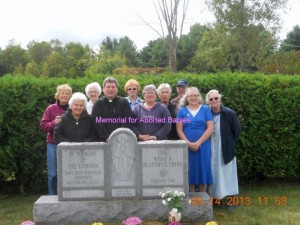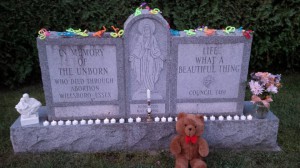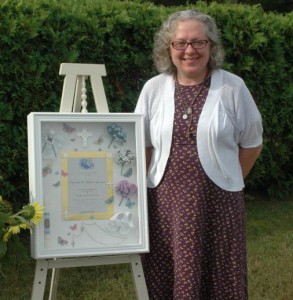By: Cullen Herout – Cullen is a licensed mental health practitioner and a pro-life writer. He has been working with Rachel’s Vineyard for more than five years.
In April 2011, I began working with the post-abortion ministry Rachel’s Vineyard. The ministry hosts weekend retreats for men and women who have chosen or been a part of an abortion. Over the years I have witnessed many amazing transformations in the lives of retreatants. Not only that, I have learned an incredible amount about faith, forgiveness, and the pain that abortion can cause in a person’s life.
The retreat weekends have a unique way of helping men and women come to know forgiveness and experience the loving acceptance of others who have also chosen to abort their children. The weekends offer a safe, non-judgmental, non-politicized environment for post-abortive persons to tell their stories, examine how abortion has affected their lives, and be heard.
But what makes the weekends so effective at bringing about healing and peace in a person’s life? Perhaps the secret lies in the importance of storytelling.
An old saying suggests that what we cannot put into words we cannot put to rest. In other words, without the ability to verbalize something negative that’s happened to us, without the ability to process and make sense of it, it will continue to reside in the emotional part of our brains, unprocessed and continuing to wreak havoc on our emotional functioning. It continues to be experienced through the emotional center of the brain, and memories, reminders, or flashbacks to the event can trigger acute emotional responses. These acute responses oftentimes persist until the person has made sense of the emotional, or perhaps even traumatic, event.
So Many Obstacles to Opening Up
I cannot count how many times on a retreat weekend I have heard “I’ve never shared my abortion story with anyone,” or “Nobody has ever asked me to tell my story,” or worse, “Nobody has ever cared or even bothered to ask me about my abortion.” Many times, the retreatants have never had or been given an opportunity to talk about their abortion experience. The emotional or physical pain they experience after an abortion often is ignored or misdiagnosed.
As Theresa Burke points out in her book “Forbidden Grief,” this is due to two factors. One, emotional or physical pain experienced immediately after an abortion is often neglected or labeled “normal aftermath.” When people express this pain, it often meets “Oh, that’s normal, you’ll get over that.” Men and women met with this response are certainly more likely to bury the negative emotions they may experience as the time goes on after the abortion.
On the other hand, when longer-term emotional pain or regret surface, they often meet confusion or disdain. If the person does muster up the courage to tell someone or ask for help, questions such as “Why are you still thinking about that?” or “You still haven’t let that go?” are often the response. Rarely is the man or woman given a chance to discuss the experience, and even more rarely given a chance to express the surrounding grief or other emotions.
Both of these responses reinforce the notion that abortion stories are better left untold. Post-abortive men and women are often made to feel as though they are harboring some sort of pathology due to post-abortive grief and regret. Thoughts such as “Maybe there is something wrong with me if I’m still suffering” can permeate a person’s thoughts. Even further still, the political rhetoric that says abortion is a personal decision can also silence those men and women who are suffering alone.
The Power of Unlocking Our Deepest Secrets
On that last note, our modern liberal culture has a particularly harsh way of silencing those who dissent from popular groupthink or opinion. The notion that abortion can, in some cases, bring intense emotional suffering, regret, shame, and grief counters the liberal narrative that abortion is a harmless, mundane medical procedure. As such, post-abortion suffering gets no attention from a liberal-oriented mainstream media. When was the last time you saw a movie or TV show about a woman grieving her aborted child, or regretting her decision? As such, those men and women who are suffering after an abortion often feel isolated and made to think they have nowhere to turn.
So when the women and men on the retreat are finally given a chance to tell their stories, it is often an extremely cathartic event. Having had the privilege of hearing so many stories, it is amazing to me the way that years, sometimes decades, of pain can come flooding out in a period of 15 or 20 minutes. Many times, the men and women are surprised by the details they can suddenly remember. Other times, they are amazed at what a relief it is to allow the emotions to come flooding out.
Almost always, through telling their story, they are surprised to find a personal core belief underneath all the pain and emotion. These core beliefs can take many forms, depending on the person’s underlying thoughts and feelings toward the abortion experience and his or her baby. Some examples of core beliefs include “I miss my baby,” “I am really angry at so and so,” or “I felt so alone.” The most common core belief is “I wish someone would have helped me make a different decision.” This particular belief speaks to the pain caused by isolating oneself either during or after the abortion experience. In all, unlocking these beliefs is an extremely powerful moment in the healing process.
I Need to Understand Why I Did That
When the men and women tell their stories on the weekend, we invite them to put the abortion story into the context of their lives. How old were they? What was their family like? Did they have any support? Whose advice did they take? These are all important considerations, and inviting the men and women to think about these questions can be extremely helpful.
On a practical note, this makes perfect sense. Our choices, good and bad, don’t happen in a vacuum. If I look back on all the mistakes I’ve made in my life, I begin to notice the various influences at play. Perhaps I listened to people I shouldn’t have and ignored the people I should’ve listened to. Perhaps I had no support, I was flying through life with nowhere to turn when things became difficult. This isn’t meant to minimize my mistakes, but rather help me to understand how I made the choices I did.
The same can be said of those who have chosen abortion. Helping them to understand the various influences at play during the time of their pregnancy and abortion can help them to make sense of the choice they made. Again, the purpose isn’t to minimize the action chosen, but rather to help them understand the choice and begin the process of healing.
The First Step of Self-Integration
Storytelling can also be very powerful because it gives a voice to those parts of our lives that we have previously been unable to voice. Any psychologist or mental health professional will tell us we are emotionally healthiest when we have integrated all parts of ourselves into the whole. We all have parts of ourselves we like, parts we don’t like, past events we wish we could erase, and so on. When we deny, feel ashamed of, or otherwise ignore certain parts of ourselves, we prohibit those parts from integrating with the rest of our whole selves. As a result, we remain emotionally unhealthy until we accept those parts of ourselves and allow them to become part of the whole.
Storytelling is key to integrating all parts of ourselves. For the post-abortive men and women who come on the retreats, it allows them to verbalize parts of themselves that they oftentimes have ignored or are otherwise embarrassed or ashamed to acknowledge. The abortion experience has frequently been cast away to the far corners of their minds and ignored, even suppressed for long periods of time. It’s one they don’t care or are afraid to acknowledge. The opportunity to tell their stories can, in many cases, help them accept that part of themselves and move toward integration.
This explains the transformations that I’ve seen on these retreats. This is the laborious first step of self-integration that happens when individuals confront and make sense of the deepest parts of themselves they have previously been unable to confront or make sense of. I’ve seen individuals show up on Friday afternoon jaded, angry, harboring resentments, and leave on Sunday afternoon with a newfound peace. I’ve seen depression turn to joy, grief turn to gratitude, and regret turn to acceptance. Many different parts of the retreat contribute to these transformations, but the storytelling aspect is at its core.
The ability to tell one’s story is an indispensable part of emotional health. It is life-giving, and when we deprive others of the ability to tell their stories, whatever that story might be, we deprive them of the opportunity to share a part of themselves with us.
Conversely, when we allow people to tell their stories, we are facilitating healing and increased emotional health. When we allow post-abortive men and women to tell their stories, not only are we able to see the pain and turmoil abortion causes, but we also help them move to a place of healing, forgiveness, and recovery.
This article originally appeared in The Federalist.



